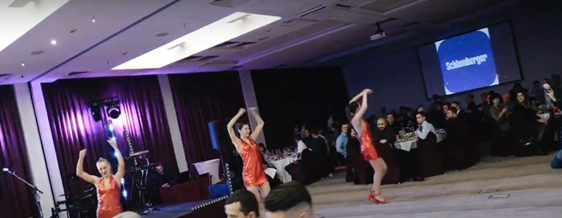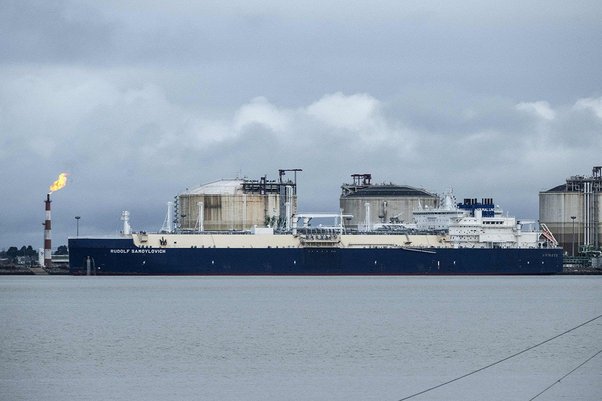The world’s biggest oilfield service company doubles down in Russia with young recruits, tech patents – and a new government contract
Dancers in skin-tight red dresses, a Saint Nick lookalike heading a conga line: this was the scene at SLB’s Russian holiday party. You’d never know there was a war on.
The energy company, part of the behemoth formerly known as Schlumberger, was celebrating another year in Putin’s Russia.
As the deadliest war in Europe since World War II continues to claim the lives of Ukrainian civilians and soldiers on both sides, SLB has entrenched its position there. The world’s largest oilfield services group, it maintains executive offices in Houston, Paris, London, and The Hague.
It is one of the few major Western companies still helping Russia produce the oil that pays for the war.
Global Witness can now reveal that late last year, as the EU was finalising its twelfth package of sanctions against Russia, a local SLB company won a new contract with a Russian federal agency to help the country produce oil.
SLB is also aggressively recruiting young Russian engineers, patenting new oil drilling technology in Russia, and running trainings on proprietary software for the fossil industry.
All signs point to it staying in the Russian Federation for the long haul – regardless of what its investors think.
In late 2023, an investment bank analyst asked CEO Olivier Le Peuch to elaborate on SLB’s plans for its Russian operations, with the apparent assumption that they would eventually end.
“And then just a follow-up is on Russia. You put out a release a couple of months ago talking about how you continue to wind down the business, and our expectation is that's going to go to 0 [zero] here. But just any update on where you stand there?” the analyst said.
“We expect it indeed to decline as a percentage but not to 0 in 2024,” Le Peuch replied, adding, “We continue to ensure that our remaining presence meets and exceeds all international sanctions.”
That careful wording keeps the door open to SLB remaining in Russia indefinitely. The company has never actually committed to exiting the country. But while Le Peuch’s response might seem evasive – or even deceptive – SLB’s investors do not appear to have raised objections.
The company’s share price has risen since the invasion. No one mentioned Russia on its most recent (Q1 2024) investor call as of this writing. And recent comments from the US State Department indicate that SLB operates in Russia with its blessing.
But Russian oil industry revenues contribute to Russian state coffers, which in turn fund the war in Ukraine. The bottom line appears to be simple: Russian oil trumps Ukrainian lives.

After this article was written, a YouTube video of SLB’s Russian holiday party, posted by the event planner (screenshot above), was locked as private.
It is unclear whether the privacy settings of the video were changed in response to Global Witness’s request for SLB to comment in advance of the publication of this article.
A helping hand
In December 2023, Technology Company Schlumberger (tax identification number 7709413265), a Russian subsidiary of SLB group parent company Schlumberger N.V., signed a modest contract with the Russian oil and gas research institute VNIGNI.
The federally-funded institute does geological research to support Russian fossil fuel exploration. The contract itself, for 13.4 million rubles (approximately £120,000 as of this writing) over twelve months, commits SLB to supporting VNIGNI build models of oil and gas deposits.
In other words, Russia hired SLB to help it produce oil.
While the Russian energy sector has not been comprehensively sanctioned, its financial sector has. Technology Company Schlumberger’s banking details, given in publicly accessible documents for the VNIGNI contract, name a PJSC Rosbank account.
Rosbank was sanctioned by the US government in 2022 and by the EU in 2023.
Remarkably, given the sanctions G7 nations have enacted to damage Russia’s oil revenues, this is not illegal. Neither the EU nor US have sanctioned the research institute VNIGNI, and it does not appear to violate EU sanctions for a Russian subsidiary of an EU entity, such as SLB, to do business with Rosbank.
In comments reported by Reuters in May, US Assistant Secretary of State Geoffrey Pyatt said that he had spoken with Le Peuch and that SLB understood the “guard rails” that allowed the company to continue operating in Russia without violating sanctions.
Asked to define these guard rails, the State Department pointed Global Witness to various publications, including a Treasury Department statement that the “energy sector of the Russian Federation economy itself is not subject to comprehensive sanctions.”
Indeed, since the invasion, the West has chosen to prioritise keeping Russia’s oil flowing over decisive actions that would have done more damage to its oil exports and revenues.
Patenting the future
Since Russia’s full-scale invasion of Ukraine in 2022, SLB companies have patented 43 inventions in Russia and registered six proprietary computer programs there.
Most of these patents are held by Schlumberger Technology B.V., a Dutch company in the SLB group. The inventions’ bland names (“Cement Compositions and Methods”, “Method for Hydraulic Fracturing”) belie the key role SLB plays in the Russian oil sector.
It can take years to secure a patent, and records show that in many instances SLB began the process of registering these inventions before the invasion.
But the company continued to advance this process even as the war on Ukraine has ground on, paying fees to the Russian patent office and filing the paperwork necessary to protect its intellectual property.
Immediately after the invasion, the Kremlin decreed that patents held by inventors from “unfriendly countries”, including the Netherlands, could be freely infringed upon.
However, according to Riikka Palmos, a trademark lawyer at Finnish firm Papula Nevinpat, the Russian courts have so far tended to protect the intellectual property of such companies.
For a company planning – as SLB apparently is – to stay in Russia, it only makes sense to protect its inventions for the long run.
“Companies taking a long view of what may happen in Russia may choose to play it safe and still seek patent protection there,” Dr Margo Bagley, Vice Dean and Asa Griggs Candler Professor of Law at Emory School of Law, told Global Witness. Dr Bagley spoke generally and was not specifically asked about SLB.
If patent filings can reveal companies’ intentions in Russia, however, the picture is mixed.
Halliburton, one of SLB’s global competitors, has secured 35 Russian patents in the time period Global Witness examined. Baker Hughes, another competitor, has won zero.
Both companies have sold their Russian holdings.
Global Witness contacted Halliburton to ask whether its new patents signalled it intended to return to Russia. The company did not respond.
Filling the talent pipeline
SLB’s Russian recruiters seem to have been working overtime this year. In the first quarter of 2024, the company advertised 19 job fairs and presentations, almost all at universities – double the rate of the same period of 2023.
“Moscow never sleeps, and Schlumberger never misses an opportunity to meet with students!” the company said on the Russian social media site VKontakte, where it posts interview tips and Pokémon images between notifications of career events.
Recruiting young people is standard operating procedure for SLB.
"Early-career recruiting has always been part of the SLB culture,” an American hiring manager said in 2023. But the intensity of its efforts to hire Russian staff out of university raises questions about SLB’s plans in the country.
In early June, SLB was advertising 125 positions in Russia, compared to 325 in all the other countries in which the company operates combined.
The latter figure excludes some early-career and internship positions, but nevertheless suggests that hiring in Russia makes up a substantial percentage of SLB’s global recruiting effort.
“Crucial” training
SLB’s Russia site advertised more than 10 professional development classes from just April through June of 2024.
Several of these train users on PETREL and ECLIPSE, oil reservoir and geological modelling programmes that play a “crucial” industry role, according to Stanford’s International Working Group on Russian Sanctions.
These programmes help SLB’s clients to extract more oil from the ageing Western Siberian fields that make up most of Russia’s production.
Exactly which projects, or how much oil production, would not be economically feasible without SLB’s involvement in Russia is debated. What is undisputed is that SLB’s technology makes it cheaper for Russian companies to produce oil.
Betting on Russia
SLB is the biggest Western oilfield services company still operating in Russia. Its investors might be forgiven, however, for not remembering that.
The company’s most recent annual report available as of this writing, from 2022, scarcely mentions the country except to cite SLB’s belated decision to suspend deploying new investment and technology to its Russia operations.
In July 2023, the company said it would halt shipments of products and technology into Russia from all SLB facilities worldwide. It said nothing about other imports.
Between the date of that statement and April 25, 2024, SLB companies in Russia imported about $4.4 million of oil drilling equipment and chemicals from suppliers in India, according to Global Witness analysis of customs data.
These shipments included tens of thousands of kilograms of 19 different drilling chemicals, many of them trademarked by SLB companies.
This is not illegal, and CEO Le Peuch has been careful to remind investors that SLB’s operations in Russia do not violate sanctions. Still, it would seem to demonstrate the limit of the company’s commitment to cease imports of products and technology to Russia.
Regardless, the company’s decision to remain in Russia – busily hiring, patenting inventions, and training up the next generation of oil and gas workers – does not appear to have hurt it financially.
SLB’s share price increased more than 20% from the day of the invasion to early July, 2024. In April, it announced plans to return $7 billion to investors over the next two years.
SLB did not respond to multiple requests for comment for this article.
What next
Rising crude prices and a weaker ruble mean that the Russian state clawed in about £51 billion in oil and gas revenues in the first half of this year – a 41% year-on-year increase, despite existing sanctions. That is money used to wage war on Ukraine.
More than two years after the invasion, Western governments have dragged their feet in using all the tools at their disposal to damage Russia’s oil revenues. This delay costs no one more than Ukraine.
The G7 group of nations must expand sanctions to immediately ban oilfield service companies like SLB from working in Russia, while speeding the roll-out of renewable energy technologies at home.


